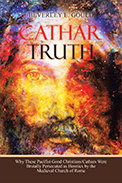
 |
Cathar Truth: Why These Pacifist Good Christians/Cathars Were Brutally Persecuted as Heretics by the Medieval Church of Rome
by Beverley E. Gould
Xlibris
A chance message from ancient times prompted the author to study the actions and beliefs of the early Christian group known as Cathars. They were centered in the Languedoc region of Southern France and may have been connected to similar groups such as the Essenes, Gnostics, and Knights Templar, with whom they shared various radical religious views. The Cathars, who called themselves the Good People, believed that Jesus may not have died on the cross and that Paul’s preaching was contrary to the teachings of Jesus. They believed in reincarnation, respected women, considered Mary Magdalene to have been a spiritually guided person, and felt that the Catholic Church had become corrupt and greedy. They considered themselves true Christians. Seeing these views as both threatening and heretical, the Church determined to destroy all vestiges of Catharism, burning many followers at the stake.
Told by a visionary priest that she was personally connected to the Cathars in a previous incarnation, Gould, who had had a near-death experience and was seeking a broader understanding of life, took this message as a sign. She resolved to see how that connection might help her and others, undertaking a serious study of conventional theology and then an in-depth exploration of the Cathars. Her book is weighted with the facts she has gleaned, accompanied by her own honest assessments. The final segment is a fictionalized version of what she believes may have happened to the last vestiges of the Good People and how their knowledge was saved for future generations. Through this combination of fact and imaginative storytelling, Gould pays homage to Catharism still surviving in scattered remnants. The author’s subject matter is sure to spark discussion and debate. Her writing is clear, academically solid, and sufficiently personal to engage any average reader.
RECOMMENDED by the US Review